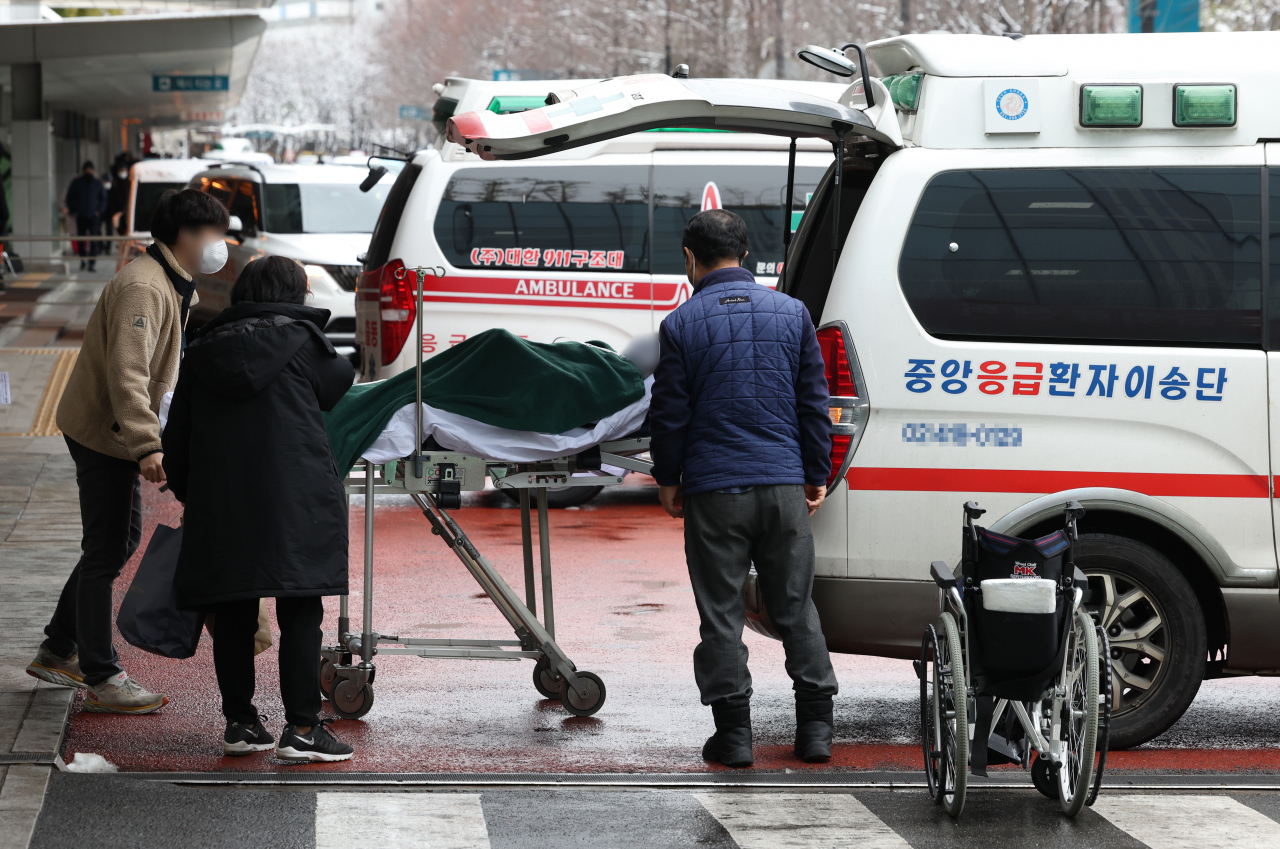 |
A patient is carried to an ambulance at a general hospital in Seoul on Thursday, to be transferred to another hospital amid an ongoing strike by trainee doctors. (Yonhap) |
South Korean hospitals are experiencing further disruption amid a growing walkout by the country’s junior doctors, who perform surgeries and provide other treatment at major hospitals.
The Ministry of Health and Welfare received 40 adverse effects from the doctor walkout as of 6 p.m. on Thursday, with reports renewing daily. These cases consist of 27 instances of delayed surgery, six cases of patients being refused treatment, four appointment cancellations, and three delays in hospitalization.
The ministry added that there had been 189 similar cases since Monday.
As of 10 p.m. on Thursday, a total of 8,897 resignations had been submitted, equal to approximately 78.5 percent of the total number of trainee doctors. The Ministry of Health and Welfare has stated that the processing of resignation submissions is still ongoing.
The number actually absent from work, 7,863, was lower, but the ministry noted that it only covered 94 training hospitals, with 6 excluded due to inadequate data.
The walkout has prompted major general hospitals to cancel elective surgeries.
For instance, as of Tuesday, Severance Hospital reduced its operations by 50 percent, while Samsung Medical Center, Asan Medical Center and Seoul St. Mary’s Hospital said they had canceled around 30 percent of their surgeries, according to health authorities.
According to local reports, a general hospital in Ulsan refused to admit a cancer patient who had arrived for post-operative care, and another cancer patient remained neglected even though a catheter in his urinary tract broke during chemotherapy. Some pregnant women also had cesarean sections canceled.
Some patients seeking emergency care have been forced to travel hundreds of kilometers to see an ER doctor after being denied treatment at strike-hit general hospitals.
According to the Gangwon Fire Headquarters, a 60-something diabetes patient in Yangyang, Gangwon Province town, called the 119 emergency hotline for help at around 11:30 a.m. Wednesday after developing severe necrosis in his leg. But Gangneung Asan Hospital, one of the largest medical centers in the area rejected him, saying there were no trainee doctors in its emergency room.
After all other major hospitals in Gangneung and nearby Sokcho reacted similarly, the patient was eventually treated at Wonju Severance Christian Hospital around 100 km away at around 3 p.m.
A former South Korean professional gamer was put in danger due to the walkout, too. Former Overwatch League star Ryu Je-hong’s YouTube channel announcement reads, “Ryu is currently hospitalized after surgery. He was involved in a car accident at dawn.”
His friend, who is also a professional gamer, Kim Do-hyeon said on a live show that “Ryu was in an accident around 2 a.m. Tuesday, and after calling 20-30 hospitals and being rejected, he was finally admitted into an emergency surgery at 10 a.m. There was an eight-hour delay due to the walkout.”
With most of the striking trainee doctors refusing to follow the government's return-to-work orders, specialists and nurses have reportedly been struggling to carry out tasks usually reserved for doctors through extended overtime and other means.
The Korean Nurses Association held a press conference on Friday and said "As trainee doctors stage walkouts, the nurses who replace them are being pushed to carry out tasks reserved for doctors. The nurses write proxy prescriptions, proxy records, and even procedures such as treatments, tests, and surgical sutures."
"Surely, it's illegal for nurses to do these tasks. If something goes wrong with the patient in the process, nurses are required by law to take all the responsibility," Tak Young-ran, the chair of the Korean Nurses Association stressed.
Meanwhile, Vice Health Minister Park Min-soo said on Thursday that authorities would not be accepting the resignation letters from the trainee doctors and urged them to consider the consequences of the strike.
“The power of doctors does not come from collective action,” he said. “Please remember that patients are waiting for you at this very moment.”
The South Korean government raised its four-scale health care service crisis gauge to the highest level of "serious" as of Friday morning in response to the staff shortage brought by junior doctors’ mass resignation.







![[Today’s K-pop] Blackpink’s Jennie, Lisa invited to Coachella as solo acts](http://res.heraldm.com/phpwas/restmb_idxmake.php?idx=644&simg=/content/image/2024/11/21/20241121050099_0.jpg)